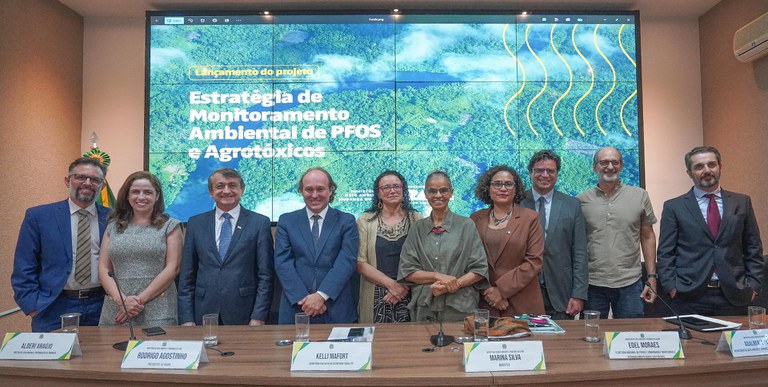Advanced cookie settings
To improve your experience on the platform and provide personalized services, we use cookies.
Notícias
ENVIRONMENTAL QUALITY

Strategy was launched by the Ministry of the Environment and Climate Change (MMA) and EMBRAPA - Environment, with the support of IBAMA - Image: Fernando Donasci/MMA
On Thursday, February 20, Brazil's Ministry of the Environment and Climate Change (Ministério do Meio Ambiente e Mudança do Clima /MMA) and the Environmental Division of the Brazilian Agricultural Research Corporation (Empresa Brasileira de Pesquisa Agropecuária - Meio Ambiente /EMBRAPA - Environment) launched the Environmental Monitoring Strategy for PFOS and Pesticides (Estratégia de Monitoramento Ambiental de PFOS e Agrotóxicos).
With the support of the Brazilian Institute of Environment and Renewable Natural Resources (Instituto Brasileiro do Meio Ambiente e dos Recursos Naturais Renováveis /IBAMA), the initiative aims to generate systematized data on environmental contamination by pesticides and PFOS — persistent pesticide-derived substances— in Brazil to inform public policy development. Over the next three years, the presence of 53 active ingredients will be monitored nationwide.
During the launching act in Brasília (Federal District), the Minister of Environment and Climate Change, Marina Silva, emphasized the importance of data-driven decision-making. “Our role is to leverage technology and knowledge to protect the environment and public health while also enhancing the quality of our businesses and investments,” she stated.
Alderi Araújo, EMBRAPA’s Governance and Information Director, highlighted the strategy’s role in improving pesticide contamination monitoring. “[This monitoring] is essential for ensuring that production aligns with environmental, economic, and social sustainability,” he said.
Rodrigo Agostinho, President of IBAMA, underscored the strategy’s significance in guaranteeing food safety for Brazilians. “For the first time, we will systematically monitor a wide range of substances that have been used in agriculture and livestock production over the past decades,” he noted.
Kelli Mafor, Executive Secretary of the General Secretariat of the Presidency of the Republic (Secretaria-Geral da Presidência da República), stressed the importance of incorporating civil society perspectives, especially those most affected by contamination. Concerns raised by civil society often serve as key indicators of what needs to be monitored and studied,” she said. “This strategy brings hope that we can transform a reality that harms human health and the environment, rather than simply normalizing it.”
The event was also attended by Adalberto Maluf, National Secretary for Urban Environment, Water Resources, and Environmental Quality; Edel Moraes, National Secretary for Traditional Peoples, Communities, and Sustainable Rural Development (both from MMA); and Rogério Dias, President of Instituto Brasil Orgânico.
STRATEGY PILLARS — Recognized as a pioneering initiative, the strategy also seeks to enhance pesticide monitoring, mitigate their impact on human health and the environment, promote sustainable agricultural practices, and support scientific research. It is built on three key pillars:
The initiative aligns with the goals of the Stockholm and Rotterdam Conventions, which regulate chemical management, reinforcing Brazil’s commitment to sustainable management and pesticide control.
